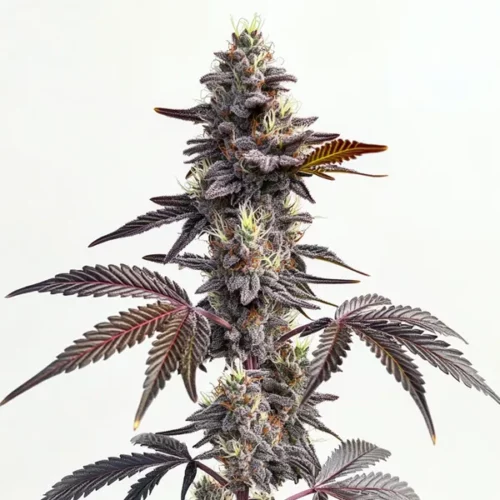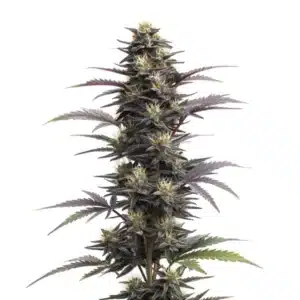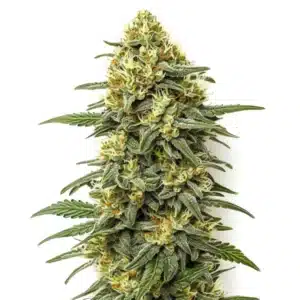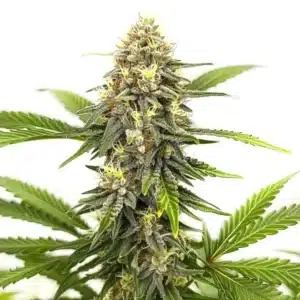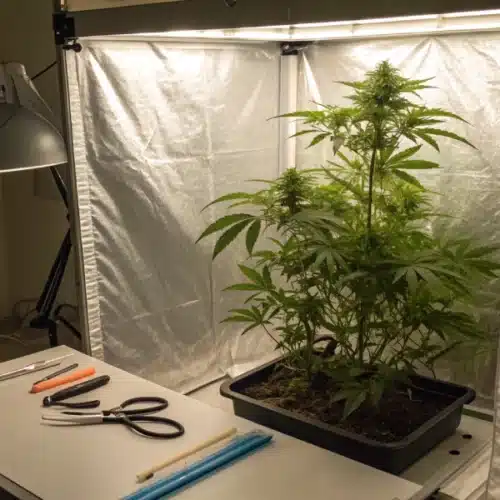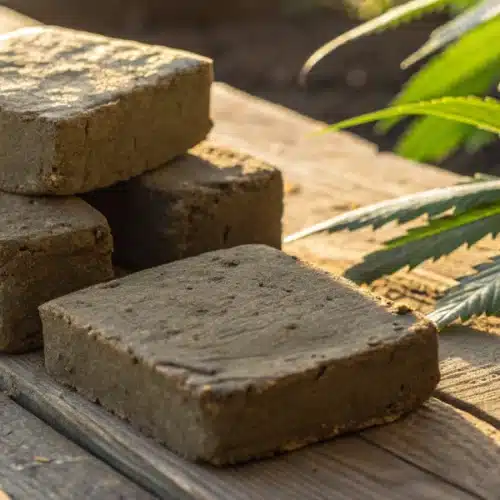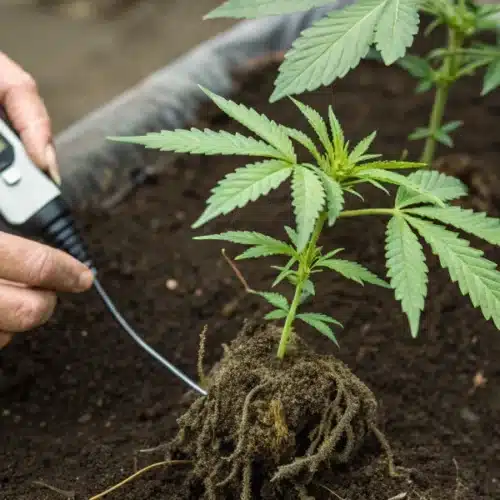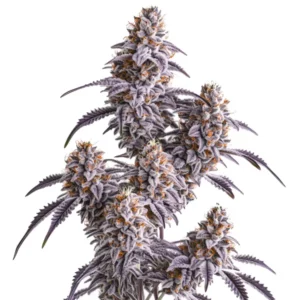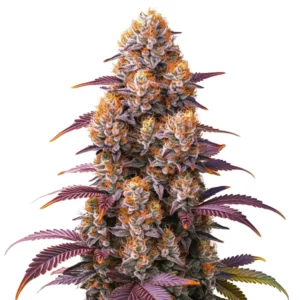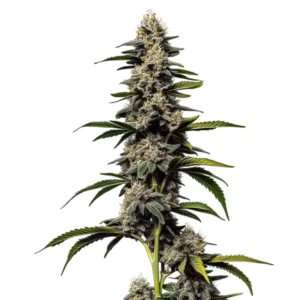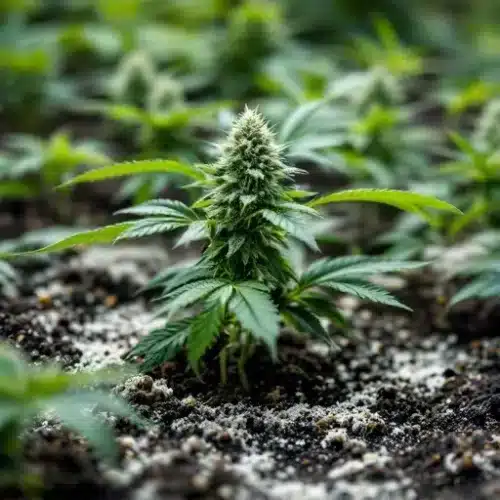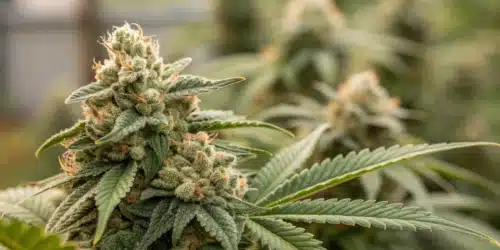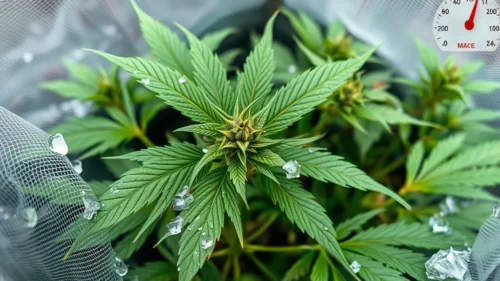Growing marijuana involves a blend of artistry and scientific precision, requiring the right balance of expertise, attention, and hemp fertilizers. Whether you’re just starting out or have years of experience, choosing the best fertilizer for marijuana plays a key role in boosting your yields and improving the quality of your buds. This in-depth guide provides valuable information on the top fertilizers for marijuana, discussing different types, their benefits, and how to apply them effectively. We’ll also take a closer look at the powerful yet specialized option of compost tea for cannabis.
Recommended Strains
Modified Grapes
 THC: 25% - 27%
THC: 25% - 27% Type of seed: Feminized
Type of seed: Feminized Phenotype: Mostly Indica
Phenotype: Mostly Indica Day to flower: 8 - 9 weeks
Day to flower: 8 - 9 weeks
5 Alive
 THC: 20% - 27%
THC: 20% - 27% Type of seed: Feminized
Type of seed: Feminized Phenotype: Mostly Sativa
Phenotype: Mostly Sativa Day to flower: 8 - 10 weeks
Day to flower: 8 - 10 weeks
Basics of Marijuana Fertilizers
Marijuana plants, like all plants, require a specific set of nutrients to thrive. These nutrients are broadly categorized into macronutrients and micronutrients. The primary macronutrients essential for marijuana growth are Nitrogen (N), Phosphorus (P), and Potassium (K), often abbreviated as NPK. These elements are key at various stages of the plant’s lifecycle, making them vital components of the best hemp fertilizer for marijuana.
- Nitrogen (N): Essential for leaf growth and overall plant development.
- Phosphorus (P): Vital for root development and flowering.
- Potassium (K): Important for overall plant health, disease resistance, and bud formation.
Best Fertilizer for Marijuana – Macronutrients
In addition to NPK, marijuana plants also need secondary macronutrients like Calcium (Ca), Magnesium (Mg), and Sulfur (S). These nutrients support various physiological functions, enhancing the plant’s ability to absorb and utilize the primary nutrients.
Best Fertilizer for Marijuana – Micronutrients
Micronutrients, although needed in smaller quantities, are equally important. These include Iron (Fe), Manganese (Mn), Zinc (Zn), Copper (Cu), Molybdenum (Mo), Boron (B), and Chlorine (Cl). A deficiency or excess of these elements can lead to nutrient imbalances, affecting plant health and yield. This balance is important when determining the best fertilizer for weed.
Promos & Deals
The Best Fertilizer for Marijuana: Organic vs. Synthetic
Choosing between organic and synthetic fertilizers is a key decision for growers. Each option offers its own benefits and potential downsides. Knowing these differences will help you pick the best fertilizer for marijuana, whether you’re seeking the best fertilizer for weed or cannabis.
Organic Fertilizers
Organic fertilizers, including hemp fertilizers, are derived from natural sources such as compost, manure, bone meal, and fish emulsion. They provide a slow release of nutrients, enhancing soil health and promoting beneficial microbial activity.
Advantages of Organic Fertilizers:
- Sustainable: Organic fertilizers are environmentally friendly and sustainable. They are made from natural ingredients that decompose naturally in the soil, reducing the environmental impact of your cultivation practices.
- Improves Soil Structure: Organic matter in these fertilizers improves soil structure, increases water retention, and enhances aeration. This leads to healthier root systems and better overall plant health.
- Promotes Beneficial Microbes: Organic fertilizers encourage the growth of beneficial soil microorganisms, which help in breaking down organic matter and making nutrients more available to plants. This symbiotic relationship enhances plant growth and resilience.
Popular Organic Fertilizers:
- Compost: Compost is rich in a variety of nutrients and improves soil structure. It is made from decomposed organic matter, such as kitchen scraps and yard waste, and is an excellent all-around fertilizer.
- Worm Castings: Worm castings, also known as vermicompost, are an excellent source of nutrients and beneficial microbes. They improve soil aeration and water retention while providing a balanced nutrient profile.
- Bone Meal: Bone meal is high in phosphorus, making it ideal for the flowering stages of marijuana growth. It promotes strong root development and enhances flower production.
- Fish Emulsion: Fish emulsion is a liquid fertilizer made from fish waste. It provides a balanced mix of nutrients that are easily absorbed by plants, making it a great choice for both vegetative and flowering stages.
Synthetic Fertilizers
Synthetic fertilizers are chemically formulated to provide precise nutrient ratios. They are designed for quick absorption, making them suitable for addressing specific nutrient deficiencies in cannabis promptly. The best fertilizer for cannabis often involves a balanced approach, using synthetic options for targeted nutrient delivery.
Advantages of Synthetic Fertilizers:
- Quick Results: Synthetic fertilizers are water-soluble and are rapidly absorbed by plants, providing quick results. This makes them ideal for correcting nutrient deficiencies and promoting rapid growth.
- Controlled Nutrient Release: Synthetic fertilizers are formulated to provide precise nutrient ratios tailored to different growth stages. This ensures that plants receive the exact nutrients they need at each stage of development.
- Ease of Use: Synthetic fertilizers are typically easier to apply and manage, as they come in pre-measured formulations. This reduces the risk of over- or under-fertilizing your plants.
While synthetic fertilizers offer the advantage of immediate nutrient availability, they may not improve soil health over the long term. They can also lead to nutrient buildup in the soil, potentially causing imbalances and harming beneficial soil microorganisms. That’s why many growers seeking the best fertilizer for marijuana choose to combine synthetic options with organic alternatives. This approach helps maintain soil health while still delivering the essential nutrients plants need.
Synthetic Fertilizers
Synthetic fertilizers are chemically formulated to provide precise nutrient ratios. They are designed for quick absorption, making them suitable for addressing specific nutrient deficiencies promptly.
Advantages of Synthetic Fertilizers:
- Quick Results: Rapidly corrects nutrient deficiencies.
- Controlled Nutrient Release: Provides precise nutrient ratios tailored to different growth stages.
- Ease of Use: Typically easier to apply and manage.
Popular Synthetic Fertilizers:
- General Hydroponics Flora Series: A comprehensive three-part nutrient system.
- FoxFarm Trio: Well-known for producing impressive results in both soil and hydroponic setups.
- Advanced Nutrients Line: Offers a wide range of products tailored to specific needs.
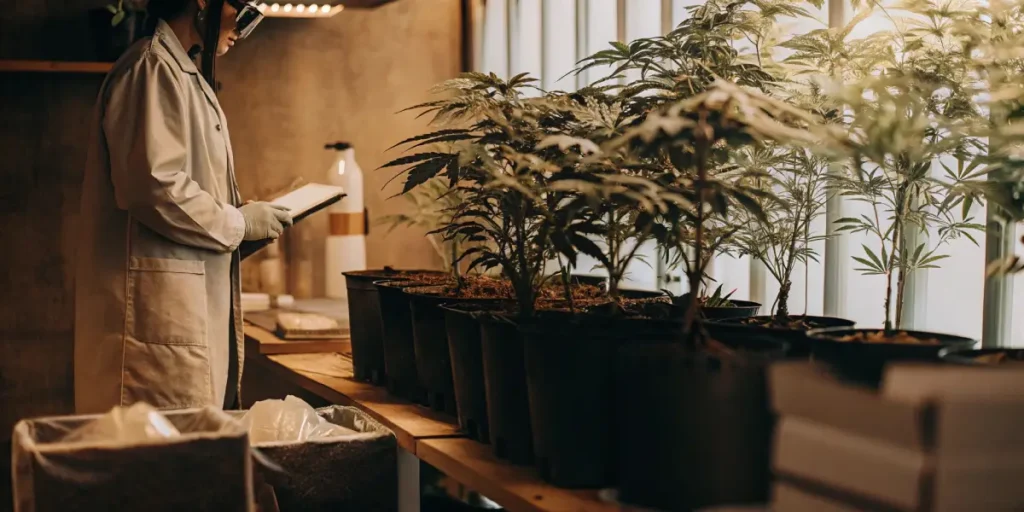
Best Fertilizer for Weed: Tailoring Nutrients to Growth Stages
Marijuana plants have specific nutrient needs that vary throughout their lifecycle. Knowing these requirements is key to optimizing growth and achieving higher yields. Selecting the Best Fertilizer for Marijuana at each stage of growth guarantees that plants get the right nutrients when they need them.
Seedling Stage
At the seedling stage, marijuana plants require minimal nutrients. Over-fertilizing at this stage can lead to nutrient burn and stunted growth. Instead, a gentle, balanced fertilizer with a low NPK ratio is recommended. The focus should be on creating a healthy root system, as strong roots are essential for future growth.
Vegetative Stage
During the vegetative stage, marijuana plants experience rapid growth. This stage demands high levels of nitrogen, which supports the development of lush, green foliage. Nitrogen is vital for photosynthesis, the process that allows plants to convert light into energy. To support this phase effectively, growers often seek the Best Fertilizer for Marijuana that offers a balanced blend rich in nitrogen and other essential nutrients. Besides, potassium helps strengthen stems and branches, enabling the plant to bear the weight of the developing buds.
Key Nutrients for the Vegetative Stage:
- High Nitrogen (N): Encourages vigorous leaf and stem growth.
- Moderate Phosphorus (P): Supports root development and overall plant health.
- High Potassium (K): Enhances disease resistance and strengthens plant structure.
Flowering Stage
In the flowering stage, the plant’s energy shifts from growing leaves and stems to producing buds. During this period, phosphorus becomes the most critical nutrient, as it supports the development of flowers. Potassium is also essential during this stage, as it helps with overall plant health and enhances the quality of the buds.
Key Nutrients for the Flowering Stage:
- High Phosphorus (P): Key for bud formation and development.
- Moderate Nitrogen (N): Still needed but in lower amounts than during the vegetative stage.
- High Potassium (K): Supports overall plant health and enhances bud quality.
By adjusting the nutrient mix according to the plant’s stage of growth, growers can ensure that their marijuana plants remain healthy and productive throughout their lifecycle. Using the best dry cannabis fertilizer tailored to these stages will maximize your yield and the quality of your buds.
Best Fertilizer for Cannabis: The pH and Nutrient Absorption
The effectiveness of fertilizers is significantly influenced by the pH level of the growing medium. Marijuana plants prefer a slightly acidic pH, typically between 6.0 and 6.8 for soil and 5.5 to 6.5 for hydroponic systems. Monitoring and adjusting pH levels ensures optimal nutrient absorption, preventing nutrient lockout. This is an important part of using the best fertilizer for marijuana effectively.
pH Management
Importance of pH Balance: Maintaining the correct pH balance in your growing medium is essential because it affects the plant’s ability to absorb nutrients. If the pH level is too high or too low, even if you are using the best fertilizer for weed, the plants may not be able to uptake the nutrients efficiently, leading to deficiencies and poor growth.
Adjusting pH Levels: There are products available, such as pH Up and pH Down solutions, which help in adjusting the pH of your nutrient solution. These products are essential tools for any serious marijuana grower, ensuring that the nutrient environment remains optimal for plant health.
Monitoring pH: Regular testing of the pH levels in your water and soil is vital. pH testing kits and meters are widely available and easy to use. By consistently monitoring and adjusting the pH, you can prevent nutrient lockout and ensure your plants are receiving the full benefit of the nutrients provided by the best cannabis soil fertilizer.
Nutrient Absorption
Nutrient Uptake Explained: Different nutrients are absorbed by plant roots depending on the pH levels. For instance, nitrogen, phosphorus, and potassium are best taken in when the pH is slightly acidic, which is the optimal range for marijuana plants. If the pH moves too far from this range, these key nutrients become less accessible to the plant, even if they are available in the soil or nutrient solution.
Nutrient Lockout: This condition occurs when the pH level is outside the optimal range, causing the plant roots to be unable to absorb certain nutrients. Symptoms of nutrient lockout include yellowing leaves, stunted growth, and poor bud development. By managing pH levels effectively, you can prevent nutrient lockout and ensure that your plants are able to access all the nutrients they need from the best fertilizer for marijuana.
Best Cannabis Fertilizer: Balancing Nutrients and Avoiding Deficiencies
Balancing nutrients is key to the health and productivity of your marijuana plants. An excess of one nutrient can cause toxicity, while a shortage may lead to deficiencies. Recognizing the signs of nutrient deficiencies and addressing them quickly is essential for maintaining a healthy grow.
Common Nutrient Deficiencies
- Nitrogen Deficiency: Nitrogen is vital for healthy leaf development and the plant’s overall strength. When there’s a deficiency, you’ll often notice yellowing leaves, beginning at the base of the plant and progressing upward. This happens because the plant directs nitrogen to support its newer growth, drawing it from the older leaves.
- Phosphorus Deficiency: Phosphorus is vital for energy transfer and flowering. Signs of deficiency include darkening and purpling of leaves, stunted growth, and poor bud development. Plants may also exhibit delayed maturity.
- Potassium Deficiency: Potassium is essential for overall plant health and disease resistance. Deficiency symptoms include yellowing and browning of leaf edges, weak stems, and increased susceptibility to diseases. Leaves may also curl and develop necrotic spots.
Addressing Nutrient Deficiencies
To address nutrient deficiencies effectively, first identify the specific deficiency based on the symptoms. Once identified, you can adjust your fertilizer regimen accordingly.
Foliar Sprays: Foliar feeding involves spraying a nutrient solution, such as one derived from hemp fertilizer, directly onto the leaves. This method allows for quick absorption and is particularly useful for correcting deficiencies rapidly. However, it should not replace regular soil or hydroponic feeding but rather complement it.
Soil Amendments: Adding specific fertilizers or amendments to the soil can correct deficiencies. For example, if your plants are nitrogen-deficient, consider incorporating a nitrogen-rich fertilizer like blood meal or a high-nitrogen synthetic fertilizer into the soil.
Balanced Nutrient Solutions: Using a balanced nutrient solution tailored to the growth stage of your plants can prevent deficiencies. These solutions provide the right mix of macro and micronutrients, ensuring that your plants receive comprehensive nutrition.
Regular Monitoring: Regularly check your plants for signs of nutrient deficiencies and adjust your feeding schedule as needed. Soil testing can also provide valuable insights into the nutrient content and pH of your growing medium, allowing for more precise adjustments.
By actively managing nutrient levels and promptly addressing deficiencies, you can maintain healthy, vigorous plants that produce high-quality buds. The best fertilizer for cannabis, combined with careful monitoring and adjustment, will help you achieve optimal results.
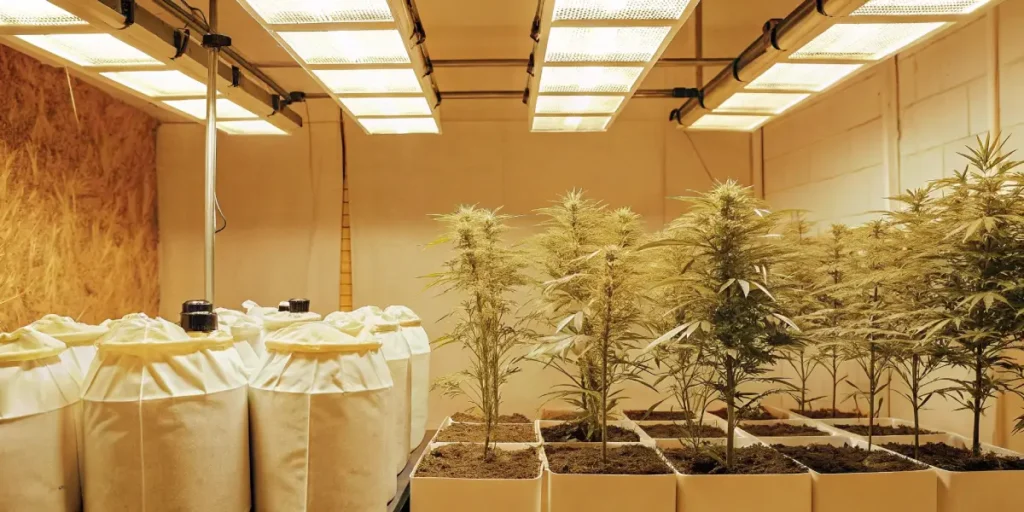
Compost Tea for Cannabis: A Natural Nutrient Boost
Compost tea is a potent, organic nutrient solution made by steeping compost in water. Combined with hemp fertilizer, it becomes rich in beneficial microorganisms, enzymes, and nutrients, making it an excellent supplement for marijuana plants.
Benefits of Compost Tea for Cannabis
- Enhances Soil Health: Introduces beneficial microbes that improve soil structure and nutrient availability.
- Boosts Plant Immunity: Helps plants resist diseases and pests.
- Promotes Vigorous Growth: Provides a balanced mix of nutrients, enhancing overall plant health.
Making Compost Tea for Cannabis
Ingredients:
- High-Quality Compost: Source of beneficial microbes and nutrients.
- Unsulfured Molasses: Feeds the microbes during the brewing process.
- Aeration Device: Ensures oxygenation, promoting microbial growth.
Steps:
- Fill a Bucket: Add water (preferably dechlorinated) to a large bucket.
- Add Compost: Place compost in a mesh bag and submerge in the water.
- Add Molasses: Add unsulfured molasses to feed the microbes.
- Aerate: Use an aeration device to oxygenate the mixture for 24-48 hours.
- Apply: Use the compost tea to water your plants or as a foliar spray.
Best Fertilizer for Marijuana FAQs
What is the best fertilizer for marijuana?
The best fertilizer for marijuana depends on your growing preferences. Both organic and synthetic options have their advantages. Organic fertilizers enhance soil health, while synthetic fertilizers provide quick results and precise nutrient ratios.
How do I choose between organic and synthetic fertilizers?
Organic fertilizers are sustainable and improve soil structure, making them great for long-term soil health. Synthetic fertilizers offer immediate nutrient availability and are easier to apply. Combining both can yield the best results.
Why is pH important for marijuana cultivation?
pH levels affect nutrient absorption. Marijuana plants prefer slightly acidic pH levels (6.0-6.8 for soil, 5.5-6.5 for hydroponics). Maintaining optimal pH ensures your plants can absorb nutrients effectively.
How can I address nutrient deficiencies in my marijuana plants?
Identify the specific deficiency based on symptoms and adjust your fertilizer regimen accordingly. Foliar sprays and soil amendments can quickly correct deficiencies, while balanced nutrient solutions prevent future issues.
What is compost tea, and how does it benefit cannabis plants?
Compost tea is a nutrient-rich solution made by steeping compost in water. It introduces beneficial microbes, boosts plant immunity, and promotes vigorous growth, making it an excellent supplement for cannabis cultivation.
Selecting the right fertilizer for marijuana plays a significant role in achieving successful cultivation. Whether you prefer organic or synthetic fertilizers, knowing the nutrient needs at each growth stage and managing pH levels are essential for maximizing yields. Compost tea provides a natural and effective method to enhance plant health and productivity. By adjusting your fertilizer plan to meet the specific needs of your marijuana plants, you can encourage strong growth, abundant yields, and top-quality buds.
By following these guidelines and choosing the best fertilizer for weed, you can cultivate healthy, vigorous marijuana plants that produce abundant, high-quality yields. Happy growing!

